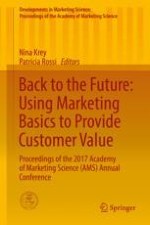2018 | OriginalPaper | Buchkapitel
Comparing Lab, Virtual, and Field Environments in Sensory Product Acceptance Testing: An Abstract
verfasst von : Marcel Lichters, Robert Möslein, Marko Sarstedt, Andreas Scharf
Erschienen in: Back to the Future: Using Marketing Basics to Provide Customer Value
Aktivieren Sie unsere intelligente Suche, um passende Fachinhalte oder Patente zu finden.
Wählen Sie Textabschnitte aus um mit Künstlicher Intelligenz passenden Patente zu finden. powered by
Markieren Sie Textabschnitte, um KI-gestützt weitere passende Inhalte zu finden. powered by
